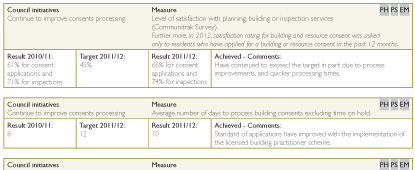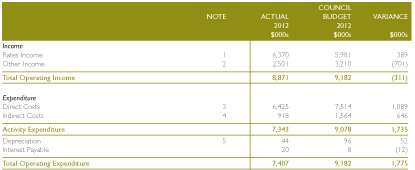At a Glance
Primary Services
- Development consents
Why We Do It
Council is required to under take the activity of resource consents under Section 31 of the Resource Management Act 1991.In addition to the legislative requirements, the activity has the ability to contribute to the wellbeing of the community and the sustainable development of the district by:
- The promotion of community confidence and trust in the resource consent procedures and decisions;
- The provision of expertise to ensure that all relevant issues are considered;
- The application of equity and fairness when considering resource consent applications; and
- The enabling of the community to undertake activities.
What Has Changed Since The LTCCP 2009/19?
Insurance cover for weather-tight homes liability has been removed. An assistance package is being proposed by central government with guaranteed inputs from both central and local government. Council has opted to remain outside this programme at this point in time and will review this decision periodically.Roads Priorities For 2011/12 |
What We Have / Haven't Achieved |
|---|---|
| Establishing a plan to ensure when growth resumes Council is able to recruit and retain the necessary specialist resources | Successful scholarship programme ongoing for planning staff. No cadet consideration has taken place for building consents. |
| Continuing implementing process improvements for consent processing | Process improvement projects continuing in both resource and building consent areas, with the latter's various improvements logged in the council wide continuous improvement register. |
| Continuing technical training programmes aiming to ensure all technical officers are formally qualified by 2013 | Ongoing training has taken place on a monthly basis in addition with the adoption of the national framework for competency the technical training has been verified by an external moderator. |
| Providing educational programmes with the development industry on the building and RMA processes and District Plan requirements | Regular practitioner meetings have been held on a quarterly basis that discusses both building and RMA aspects. Have also held an educational workshop with sector groups for example the real estate, banking and building surveyors, local planning and survey firms. |
| Continuing cooperation with all agencies in the Far North Liquor Accord, (N.Z. Police, Fire Service, and Northland Health) to promote compliance and responsible attitudes to the liquor licensing process | Far North District Council remains an active member of the FNAT group, represented by the district liquor licensing officer and the manager, environmental protection. The acting general manager of environmental management is on the steering committee. |
Future Issues / Challenges |
Implications |
|---|---|
| Economic growth leading to increasing resource consent numbers will challenge Council's ability to retain and recruit professional staff | Potential reliance on consultants and / or a reduction in the current compliance levels with statutory timeframes. |
| Rising corporate costs and overheads challenge the ability to provide the resource consent service to applicants at an affordable level | May discourage development or result in activities being under taken without consent. |
| Inaccurate advice given by inexperienced staff may have detrimental effects on key community outcomes, public health, public safety, and / or the environment | Continue professional development of staff through internal and external training opportunities. |
| Electronic and IT advancement (applications, processing, inspection and certification) | Paper based and traditional methods are costly and more time consuming. They create electronic and hard copy storage issues. |
| The Building Act Amendment Bill No. 3 has not been enacted by the Governor General. | The licensed building practitioners' scheme will be effective from 1st March 2012 and will require applications to have all restricted building work certified (memoranda / certificate of design record of work) by the practitioners. However, because of delays in finalising the legislation, no technical or guidance notes are available, (at time of compilation of this document) therefore, the exact effect of these changes is currently unknown. Guidance has now been given from the DBH as to what is required. |
Highlights of Performance

TPM = Total number of Performance Measures
 Performance 2010/11 vs. 2011/12 - needs improving
Performance 2010/11 vs. 2011/12 - needs improving
Statement of Service Performance
For DEVELOPMENT CONSENTS the following pages detail:- Service performance information provides levels of service comparative results for 2010/11 and 2011/12 including achievements and issues.
- Financial performance including comparisons against budget 2011/12.
 Print the above sections
Print the above sections

